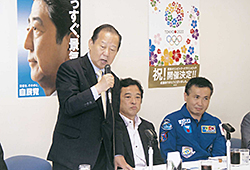
On August 5, the Party's Comprehensive Research Commission on the Establishment of the Disaster Resilient Japan (Chairman: Toshihiro Nikai, member of the House of Representatives) invited astronaut Koichi Wakata for a hearing.
In March of this year, Mr. Wakata became the first Japanese captain of the International Space Station (ISS). During his 188 days in space (the longest for any Japanese), he led a crew of American and Russian astronauts under the principle of "peace and harmony." He returned to Japan on temporary leave at the end of last month.
At the beginning of his remarks, Mr. Wakata used visuals to show the use of a robotic arm and medical experiments during his time in space, as well as life and health management on the ISS. He also expressed his gratitude for the support of so many people in enabling him to successfully complete his six-month mission.
Mr. Wakata then spoke on initiatives to use artificial satellites to make observations during disasters. Artificial satellites, he said, "are not vulnerable to inclement weather and are free of daylight constraints, and are able to monitor things like landslides, floods, and mudslides."
He went on to explain the framework for international cooperation during disasters under "Sentinel Asia," a project led by the Japan Aerospace Exploration Agency (JAXA), emphasizing the possibilities of utilizing satellite images provided by different countries to reinforce Japan's resilience to disasters.
Chairman Nikai responded to his remarks by saying, "It is extremely important to use the perspectives provided by space as we prepare for and respond to a disaster. Your remarks have given us much to think about." He closed by wishing Mr. Wakata every success in the future.










